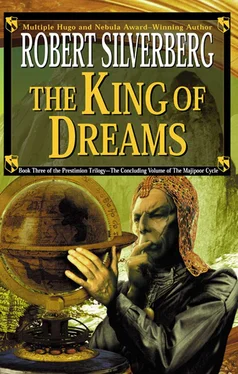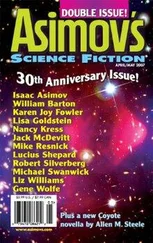“What am I supposed to do, though?”
“Part with her. A complete break.” Prestimion’s words fell upon him like boulders. “There are plenty of other women at this court who’ll be glad to keep company with you until you decide you want to marry. But this relationship is one that has to be severed. You should thank the Divine that Fulkari refused you. She’s obviously not right for you. And it makes no sense to marry a woman simply because she reminds you of someone else.’’
“Don’t you think I know that? I do. I do. And yet—”
“Yet you can’t free yourself of this obsession with her.”
Dekkeret looked away. This was becoming shameful, now. He had diminished himself woefully in Prestimion’s eyes, he knew. In a small and very unkingly voice he said, “No. I can’t. And you can’t possibly comprehend it, can you, Prestimion?”
“On the contrary. I think I can.”
There was an uncomfortable silence for a moment or two. All this while they had continued to walk between the rows of Confalume’s showcases of treasures, but neither of them was looking at anything.
In a different, more intimate tone, Prestimion said, “I can understand how the line between love and obsession can become blurred. There was a woman in my life once also, whom I loved and who was taken from me by violence—Confalume’s daughter, she was, the twin sister of Korsibar—it’s a long story, a very long story—” Prestimion seemed to be having trouble finding the words. “She was killed in the last hour of the civil war, slain right on the battlefield by Korsibar’s treacherous magus. I mourned her for years, and then, more or less, I put her behind me. Or thought I did. In time I found Varaile, who is right for me in every respect, and all was well. Except that Thismet—that was her name, Thismet—haunts me still. Hardly a month goes by when I don’t dream of her. And wake up in a cold sweat, bellowing in pain. I have never told Varaile why that is. No one has any knowledge of this. No one except you, now.”
Dekkeret had not expected any such confession. It was an astonishing thing. “We all have our ghosts, I see. Who will not quit their hold on our souls, no matter how many years may go by.”
“Yes. I thank you for sharing these private things with me, Dekkeret.”
“You don’t think the less of me for all that I’ve said?”
“Why would I? You’re human, aren’t you? We don’t expect our Coronals to be perfect in every regard. We’d put marble statues on the throne instead, if we did. And this suffering of yours can be healed, perhaps. I could have Maundigand-Klimd try to cleanse your mind of all memory of your dead cousin.”
“The same way he’s cleansed yours of Thismet?” responded Dekkeret sharply, without a moment’s pause.
Prestimion gave him a startled look. Dekkeret realized that in the depths of his shame he had suddenly felt impelled to strike back at the very man who was striving to ease his pain, and his hasty words had been hurtful ones.
“Forgive me. It was a wicked thing to say.”
“No, Dekkeret. It was a truthful thing to say. You were well within your rights to say it.” Prestimion made as if to slip his arm around Dekkeret’s shoulders, but the younger man was too tall for that. He took Dekkeret lightly by the wrist instead. “This has been a valuable conversation: one of the most important you and I have ever had. I know you much better now than ever I did before, in all these years.”
“And do you think that a man who carries a burden of this sort is worthy of being Coronal?”
“I’ll pretend you didn’t say that, I think.”
“Thank you, Prestimion.”
“And my remark a moment ago, about Maundigand-Klimd—obviously it upset you. I’m sorry for that. As you say, we all have our ghosts. And perhaps it is true that we’re condemned to carry them around with us to the end of our days. But I meant only that your memories of your dead cousin seem to be causing you great pain, and you have a world to govern, and a consort to choose, and much else facing you now, for which you’ll need the full powers of your spirit, without distraction. I think that perhaps Maundigand-Klimd could heal you of your loss. But you may very well not want to surrender your memories of Sithelle despite all the pain they cause you—just as I, I suppose, want to cling to what remains to me of Thismet. So let’s say no more of this, eh? I’m confident that you’ll heal yourself in your own way. And will deal properly with this matter of Fulkari, too.”
“I hope so.”
“You will. You’re a king now. Indecision is a luxury allowed only to the common folk.”
“I was one of those, once,” said Dekkeret. “It’s not something one ever fully escapes.” Then he smiled. “But you’re right: now I must learn to be a king. That’s a subject I fear I’ll spend the rest of my life study ing.”
“So you will, and you’ll never feel you’ve mastered it all. Don’t let that worry you. I felt the same way, and Confalume before me, and Prankipin, very likely, as well, and so on and so on back to Stiamot and the kings who came before him. It’s a thing that goes with the job. We are all common folk, Dekkeret, under our crowns and robes. The test for us is how well we rise above that. But you’ll have me to call on, when doubts arise.”
“I know that, Prestimion. I give thanks daily for that.”
“And also I’ve arranged that you’ll have my chamberlain Zeldor Luudwid for your own, when you get back to the Castle. He knows more about how to behave like a Coronal than I do myself. If there’s a problem, simply ask him. He’s yours as my gift.”
“Thank you—your majesty.”
“Say nothing of it—my lord.”
“Even a self-maintaining garden needs a certain degree of maintenance,” Dumafice Moal told his visiting nephew, as they set out together into the uppermost terrace of the magnificent park that Lord Havilbove had laid out three thousand years before. “Hence my continuing employment, dear nephew. If the park were as really perfect as people commonly believed, I’d be selling sausages in the streets of Dundilmir this day.”
The garden sprawled for forty miles along the lower slopes of Castle Mount. It began at Bibiroon Sweep, below the city of Bibiroon in the Free Cities ring, and angled down the Mount in a broad eastward-reaching curve toward the uppermost cities of the Slope Cities group, approaching at its downslope end the cities of Kazkas, Stipool, and Dundilmir. The site that the garden occupied was known as Tolingar Barrier, though nowadays it was a barrier no longer. Once it had been an almost impenetrable zone of black sharp-edged spiky hillocks, the outcropping remnants of a million-year-old flow of lava from some volcanic vein deep within the Mount. But the Coronal Lord Havilbove, who had devoted much of his reign to the construction of this garden, had had the lava hills of Tolingar Barrier ground down to fine black sand, which proved a fertile soil for the great garden that would be planted there.
Lord Havilbove, a native of the lowland city of Palaghat in the Glayge Valley, was a fastidious and orderly man who loved plants of all kinds but disliked the ease with which even the finest of gardens quickly became unruly and departed from its plan if not given constant finicky care. Therefore, while his platoons of brawny laborers were toiling to pulverize the lava beds of Tolingar Barrier, craftsmen in the workshops of the Castle were striving, through experiments in controlled breeding, to create plants and shrubs and trees that needed no touch of a gardener’s shears to maintain their graceful forms.
It was a time when the science of such biological miracles was still understood on Majipoor. The efforts of Lord Havilbove’s technicians met with gratifying success. The plants intended for his garden achieved a perfect symmetry as they grew, and when they reached a size that was appropriate in relationship to the plants about them, they held that size ever after.
Читать дальше












